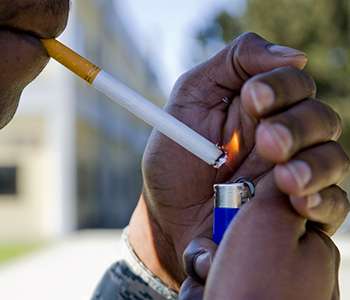Trial to study smoking-cessation therapy tailored to a smoker's DNA

A study at Washington University School of Medicine in St. Louis may aid efforts to tailor smoking-cessation treatments to individual cigarette smokers, based on their DNA.
The research team is recruiting 720 smokers from the St. Louis area who want to kick the habit. Study participants will be interviewed about their smoking behaviors and overall health. They also will provide DNA samples, from saliva, that will be analyzed to identify genetic variations that influence smoking behavior, lung cancer risk and the effectiveness of smoking-cessation treatments.
"Only about 5 percent of smokers quit successfully without medications and counseling, and we know that people who have high-risk genetic markers are even less likely to quit on their own," said Li-Shiun Chen, MD, an assistant professor of psychiatry. "We hope to demonstrate that genetic markers can be matched to the effectiveness of certain smoking-cessation therapies."
Ultimately, the researchers want to learn how a smoker's genetic makeup influences how much one smokes and how he or she will respond to drugs designed to help smokers quit. The team's earlier research indicates that DNA variations can influence the effectiveness of various smoking-cessation medications.
To be eligible, volunteers must be at least 21 and smoke five or more cigarettes daily. They must smoke traditional cigarettes, not e-cigarettes.
Study participants will be placed randomly in one of three groups. Smokers in one group will receive seven weeks of counseling to help them quit, as well as nicotine-replacement patches and lozenges, varenicline (Chantix) or an inactive placebo. All participants will receive counseling to help them quit smoking.
"We know that genetic variations make it more likely that some people will smoke more and that many will have a harder time quitting," explained Laura Jean Bierut, MD, the Alumni Endowed Professor of Psychiatry. "We want to use this information to move closer to tailoring treatment to an individual smoker's genetic makeup."
Those who take part in the one-year study will be asked to participate in telephone interviews, counseling sessions and follow-up phone calls. All office visits, counseling sessions and medications will be provided free of charge. In addition, participants will be eligible for up to $155 in compensation.
Those who volunteer for the study also can learn about their genetic roots. The researchers will send DNA samples from study volunteers to a private company that performs genetic testing, which can trace the origins of participants' early ancestors.
"Quitting smoking is very hard," Chen said. "We think we have the ability to provide more precise, tailored treatments matched to a person's genetic makeup, but the only way to make sure is to do this type of study."
More information: For more information or to volunteer for the study, call Nina Smock at 314-747-7849 or e-mail behaviorandgenetics@psychiatry.wustl.edu.


















